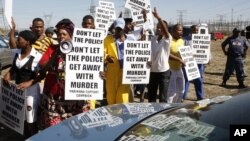JOHANNESBURG —
South African officials have begun an inquiry into violent strikes at the Lonmin platinum mine in Marikana that left at least 44 people dead.
But it was postponed on Wedenesday after families of the victims who were invited to testify failed to appear. A union official said they were not given enough notice.
The Marikana Commission will begin again once the families can be brought in, a development that a prominent activist says is a disappointing start in the search for justice.
Its central mandate of is to investigate the deaths during six weeks of wildcat strikes. In the main act of violence, police shot dead 34 protesters on August 16 after the workers launched a wildcat strike seeking higher wages. Police said they fired in self-defense.
The strike was resolved late last month and workers got a 22 percent raise, but the human toll was huge: in addition to those killed, 78 people were wounded and some 270 were arrested.
Association of Mineworkers and Construction Union treasurer Jimmy Gama said the commission chief, retired Judge Ian Farlam, postponed the hearings until the families can be summoned.
“The commission has been postponed until the 22nd of October, 2012, to allow the families of the deceased mineworkers to also be present and also to give the parties enough time to prepare for whatever documents and information they need to present and prepare,” he explained.
Photo Gallery
Activist Rehad Desai, who heads the Marikana Solidarity Campaign, expressed frustration with the commission’s slow start.
“It’s actually a disgrace," he said. "Moreover, hardly any evidence has been brought before the commission that has been requested. You know, we’re told the ballistics reports won’t be ready until the month’s end, the facilities reports aren’t final, they can’t be handed over to the commission, the whole list, the hospital schedules, who’s on duty ... The list just goes on and on.”
Desai said one family member showed up, but no one was there to meet her at the hearings and she ended up sitting outside with nothing to do.
“It’s a terrible shame, because there’s no closure until people can hear firsthand what happened," he said.
The illegal strike paralyzed South Africa’s mining industry and set off a series of copycat strikes at other gold and platinum mines. And the workers’ action appears to have emboldened other sectors to strike, including transport workers.
On Monday and Tuesday, commission officials visited the scene in Marikana, some 100 kilometers from Johannesburg. They toured the miners’ ramshackle squatter camp, the hostels where as many as seven men sleep in one room and the hospital where more wounded miners were treated. They also visited the craggy, rock-strewn field where so many people died: the 34 protesters killed by police, and the two policemen killed days before by protesters.
The commission has been given four months to do its work and present its findings.
Its deadline will conveniently overshoot a critical African National Congress meeting in mid-December where the party will choose its leader for presidential elections next year. President Jacob Zuma is the frontrunner, though the events in Marikana may have weakened him politically.
But it was postponed on Wedenesday after families of the victims who were invited to testify failed to appear. A union official said they were not given enough notice.
The Marikana Commission will begin again once the families can be brought in, a development that a prominent activist says is a disappointing start in the search for justice.
Its central mandate of is to investigate the deaths during six weeks of wildcat strikes. In the main act of violence, police shot dead 34 protesters on August 16 after the workers launched a wildcat strike seeking higher wages. Police said they fired in self-defense.
The strike was resolved late last month and workers got a 22 percent raise, but the human toll was huge: in addition to those killed, 78 people were wounded and some 270 were arrested.
Association of Mineworkers and Construction Union treasurer Jimmy Gama said the commission chief, retired Judge Ian Farlam, postponed the hearings until the families can be summoned.
“The commission has been postponed until the 22nd of October, 2012, to allow the families of the deceased mineworkers to also be present and also to give the parties enough time to prepare for whatever documents and information they need to present and prepare,” he explained.
Photo Gallery
Activist Rehad Desai, who heads the Marikana Solidarity Campaign, expressed frustration with the commission’s slow start.
“It’s actually a disgrace," he said. "Moreover, hardly any evidence has been brought before the commission that has been requested. You know, we’re told the ballistics reports won’t be ready until the month’s end, the facilities reports aren’t final, they can’t be handed over to the commission, the whole list, the hospital schedules, who’s on duty ... The list just goes on and on.”
Desai said one family member showed up, but no one was there to meet her at the hearings and she ended up sitting outside with nothing to do.
“It’s a terrible shame, because there’s no closure until people can hear firsthand what happened," he said.
The illegal strike paralyzed South Africa’s mining industry and set off a series of copycat strikes at other gold and platinum mines. And the workers’ action appears to have emboldened other sectors to strike, including transport workers.
On Monday and Tuesday, commission officials visited the scene in Marikana, some 100 kilometers from Johannesburg. They toured the miners’ ramshackle squatter camp, the hostels where as many as seven men sleep in one room and the hospital where more wounded miners were treated. They also visited the craggy, rock-strewn field where so many people died: the 34 protesters killed by police, and the two policemen killed days before by protesters.
The commission has been given four months to do its work and present its findings.
Its deadline will conveniently overshoot a critical African National Congress meeting in mid-December where the party will choose its leader for presidential elections next year. President Jacob Zuma is the frontrunner, though the events in Marikana may have weakened him politically.





